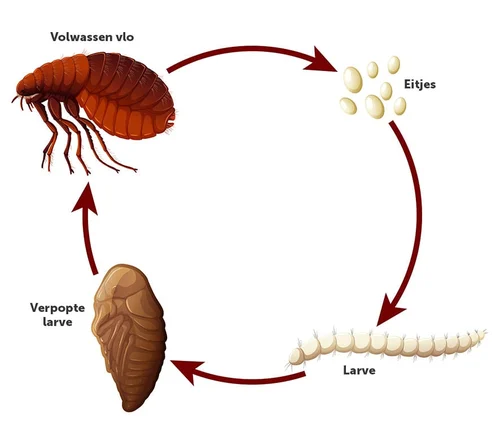Fleas in dogs
What are fleas?
Fleas are small parasites that feed on the blood of their hosts (especially mammals and birds). A flea is about 1 to 3 millimetres in size and has powerful jumping legs.
How does your dog get fleas?
A flea does not have the habit of jumping from one animal to another. Therefore, dogs almost never become infested with fleas by having contact with other animals, but due to the presence of fleas in the environment. To understand this, it is good to first know the cycle of the flea:

- A flea lays eggs on a host (the dog in this case).These can be several hundred or even a thousand eggs at a time.
- The eggs fall off the dog and end up in the environment, both outdoors and indoors.
- Larvae develop from these eggs. After several months, they pupate into fleas.
- When a suitable host comes along, it is jumped by the flea, which in turn lays new eggs.
Your dog can therefore become infested with fleas both indoors and outdoors. It is therefore important to protect your dog throughout the year.
Symptoms of fleas in your dog
The flea feeds on its host’s blood. When biting, the flea leaves behind saliva. The saliva contains irritants that cause itching. Signs that show the dog has fleas are thereby:
- Scratching
- Biting at the base of the tail and/or hind legs
- Sudden itching accompanied by jumping up
- Thinly haired or licked bare patches in the coat
- Black dots in the coat (flea poo)
Flea droppings are often mistaken for grains of sand. To be sure if it is flea poo, you can wet the grains on some white paper (e.g. tissue). Flea poo contains blood residue and if it gets wet, it will shed red/brown as a result.
As an owner, you can also get bites from the flea. You will recognise this by itchy, small red bumps, especially on the arms and legs.
Flea allergy
Some dogs can develop a flea allergy. In a flea allergy, the dog’s immune system reacts to the allergens found in the flea’s saliva. A single bite from a flea can then cause a severe, extensive inflammatory reaction.
Dogs with flea allergy are very itchy. The resulting skin problems can range from hot spots to large bald patches with flakes or so-called ‘elephant skin’.
Any dog can develop a flea allergy if it regularly comes into contact with fleas. Once the dog has become allergic to fleas, this allergy will always remain. It is therefore very important to keep dogs flea-free from puppyhood onwards.
Preventing fleas in dogs
Prevention is always better than cure. And in the case of fleas, this certainly applies, as it can be very difficult to get rid of fleas once your dog has them. We therefore recommend always treating your dog preventively against fleas. There are various products on the market for this purpose:
- Anti-flea collar
- Anti-flea spray
- Anti-flea drops
- Anti-flea tablet
- Anti-flea shampoo
As you can see, there are several ways to prevent and control fleas. Most people choose a flea tablet or drops (also called a spot-on product). You also have a choice in the duration of effect of the products. Some offer a month’s protection, some even 3 months. You can purchase these products from our clinics.
Controlling dog fleas at home
Fleas are not limited to your dog’s fur. As explained in the flea cycle, your dog becomes infested with fleas because they are present in the environment. Therefore, it is important to clean not only your dog, but also the dog basket and the rest of the house. The most effective anti-flea treatment is vacuuming. Do you have carpets or cushions? Shake these out outside first or put them in the washing machine. And don’t forget to clean the vacuum cleaner properly after use. If necessary, you can also use an environmental spray against fleas. Read the information leaflet carefully first.
Combining flea treatment with deworming
De-worming is at least as important as de-fleaing. Here’s the thing: worms hide in the eggs of fleas. By the time the flea egg hatches, the worm can infect your dog with a bacteria or virus. By combining flea treatment and worm treatment, you significantly reduce that risk.
Is your dog still suffering from fleas? We are here for you!
Is your dog or puppy constantly being bothered by fleas despite flea control? Most likely your environment is seriously infected or you are not applying anti-flea medication properly. No worries: we are happy to help you solve this problem. Feel free to contact us!

Happy Pet Health Plan
Sign up for our preventive care plan
for your dog and always get reminders when it’s time to de-flea!

